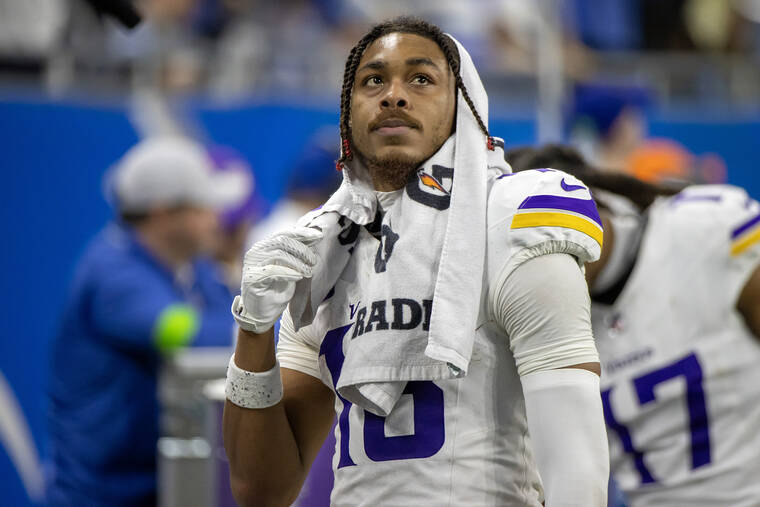MINNEAPOLIS — Over the weekend, the Minnesota Vikings coaching staff received the weekly practice plan. Printed on the white sheets of paper were countless grids, indicating the schedule for each day. Most of it was expected. Red zone situations, early-down simulations, kicking periods. Typed underneath Thursday’s slate, though, was a specific two-minute setup.
Some of the staffers wondered why.
The answer?
“Jets,” they were told.
This was the first clue that the team’s biggest superstar, wide receiver Justin “Jets” Jefferson, would be arriving in Minnesota this week for mandatory minicamp.
Then Monday morning happened. Most of the staffers sat quietly inside their offices at the TCO Performance Center. Some sipped coffee. Others scribbled notes, preparing for meetings with players. It was fairly quiet until the clock hit 8:18 a.m.
“Holy f—!” one coach yelled down the hallway.
Heads lifted. Pens fell against desks. Phones pinged with the news: The Vikings and Jefferson had agreed to a four-year, $140 million contract extension that includes $110 million guaranteed. Jefferson had become the highest-paid wide receiver in NFL history and the highest-paid non-quarterback.
Vikings’ Justin Jefferson agrees to 4-year, $140M extension
Staffers texted each other fire and airplane emojis. Others replied with Griddy dancing GIFs.
It was finally over. No more having to answer questions about when the deal would happen. No more having to read bogus rumors on social media about possible trades. No more having to wonder whether the final piece of the team’s offseason plan would fit cleanly into the puzzle.
“Justin has earned this contract,” owners Mark and Zygi Wilf said in a news release, “and we are thrilled he will remain a Minnesota Viking for a very long time.”
This agreement required more than a year of negotiations, but not because either side wavered in what it wanted. The first time general manager Kwesi Adofo-Mensah spoke about the possibility of a Jefferson extension, he termed it a “champagne problem,” meaning a topic to celebrate, not one to labor over. Jefferson essentially doubled down on that thought, acknowledging last spring that he did not see the looming extension “as a cloud hanging over my head.”
“The contract comes with the game,” he said.
Apparently, the game within the game is the hoopla that accompanies these types of discussions. Jefferson did not attend voluntary OTA workouts last year and told people privately he could not stand being away from teammates and the game he loved. There was public speculation his absence was a sign of discontent or a lack of common ground between him and the organization. It would not be the last time.
Negotiations progressed in the week leading up to the Vikings’ 2023 season opener against the Tampa Bay Buccaneers. At the time, multiple staffers shared their belief the two sides would soon come to an agreement. Jefferson ultimately accepted the risk of playing another season without a long-term deal, and in Week 5, he strained his hamstring. Some external talking heads believed Jefferson would sit out the duration of the season. Internally, the Vikings never doubted Jefferson’s desire to return to the lineup.
“When he talks about wanting a gold jacket,” a team official said at the time, “he means it. And he knows you have to play to earn that.”
He returned in Week 13 against the Las Vegas Raiders and was speared in the chest on an attempted catch over the middle of the field. An ambulance whisked him away to the hospital during the game. But he was cleared to play and did so the next week. He stood out over the final five games of the season and finished the year with over 1,000 yards — capping off a run with the most receiving yards in NFL history through his first four years.
Standing against a concrete wall in the Ford Field tunnel after the Week 18 loss to the Detroit Lions, Jefferson was asked whether he could envision a Super Bowl with the Vikings.
“Always,” he said defiantly. “As long as I’m a part of the team, I’m always going to think we have a chance.”
Jefferson gave no oxygen to the idea that last season changed his perspective on wanting to be in Minnesota long-term. Still, the hypotheticals ran rampant. Jefferson loved catching passes from Kirk Cousins, but he was always aware of (and open to) playing with a young, newly drafted quarterback. That did not prevent some from hypothesizing Jefferson would react rashly when Cousins signed with the Atlanta Falcons.
Trade ideas became fodder for clicks. One day, New England Patriots fans felt they had a chance to land Jefferson (due to erroneous reporting), and the Cincinnati Bengals were next. This spring, at the NFL Scouting Combine in Indianapolis, Adofo-Mensah passionately responded to the hearsay.
“A lot of the stuff that I hear,” Adofo-Mensah said, “is completely false. But I cannot get up here and tell you what’s true and false because that’s not how I’ve promised to do this job. But I can tell you, we’re excited to have the conversations because he’s someone we want around for a long time.”
Several months later, Adofo-Mensah described Jefferson as the “king linchpin” to the team’s organizational shift after Cousins. The Vikings created nearly $100 million in cap space for 2025 so they could pay their biggest stars, including Jefferson. They believe they can optimally develop first-round quarterback J.J. McCarthy — partially because they have Jefferson, who is a safety valve on the field and a supportive teammate behind the scenes.




